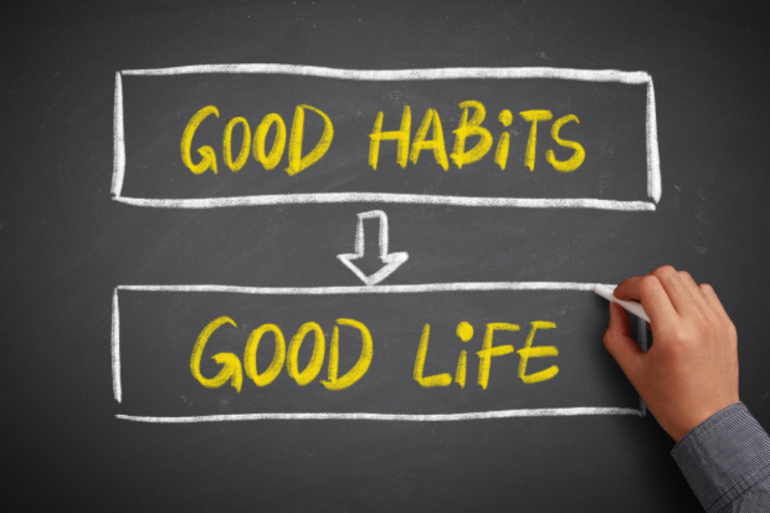Building A Good Life: Sustainable Habits For Happiness

Table of Contents
Cultivating Mindfulness and Self-Awareness
Mindfulness, the practice of being present in the moment without judgment, is a cornerstone of building a good life. By focusing on the present, you reduce stress, increase appreciation for everyday moments, and cultivate a deeper understanding of yourself. This self-awareness allows you to better manage your emotions and respond to challenges with greater clarity.
Techniques for practicing mindfulness are surprisingly accessible. Meditation, even just 5-10 minutes daily, can significantly impact your stress levels and emotional well-being. Deep breathing exercises offer a quick and easy way to center yourself throughout the day. Mindful walking, paying close attention to the sensations of your feet on the ground and the air on your skin, is another simple yet powerful technique.
- Regular meditation sessions (even 5-10 minutes daily). Use guided meditation apps or find quiet spaces for self-reflection.
- Mindful eating practices. Pay attention to the tastes, textures, and smells of your food, savoring each bite.
- Engaging in activities that promote present moment focus (e.g., yoga, gardening). These activities encourage a connection with your body and surroundings.
The benefits of consistent mindfulness practice are numerous. You'll experience improved emotional regulation, reduced anxiety, increased self-compassion, and a greater sense of peace and contentment in your daily life, all key ingredients for building a good life.
Prioritizing Physical Well-being
The connection between physical and mental health is undeniable. Neglecting your physical well-being directly impacts your emotional state, energy levels, and overall happiness. Prioritizing your physical health is a crucial component of building a good life.
This doesn't mean striving for physical perfection; it means making conscious choices to support your body and mind. Regular exercise, a balanced diet, and sufficient sleep are the pillars of a healthy lifestyle.
- Incorporating regular physical activity (at least 30 minutes most days). Find activities you enjoy, whether it's running, swimming, dancing, or simply taking a brisk walk.
- Adopting a balanced and nutritious diet. Focus on whole, unprocessed foods, fruits, vegetables, and lean protein.
- Prioritizing 7-9 hours of quality sleep per night. Establish a consistent sleep schedule and create a relaxing bedtime routine.
The rewards are significant: increased energy levels, improved mood, a boosted immune system, and a greater sense of vitality – all contributing to a happier, more fulfilling life. Building a good life starts with taking care of your physical self.
Nurturing Meaningful Relationships
Humans are social creatures; our connections with others profoundly impact our happiness and well-being. Strong, supportive relationships provide a sense of belonging, emotional security, and shared joy. Investing in these relationships is vital to building a good life.
Building and maintaining strong relationships requires effort and intention. It's about actively nurturing these connections through consistent engagement and genuine care.
- Spending quality time with loved ones. Put away your phone, truly listen, and be present in your interactions.
- Practicing active listening and empathy. Seek to understand others' perspectives and offer support.
- Expressing gratitude to those important to you. Let them know how much you appreciate their presence in your life.
The benefits of strong relationships are immeasurable: an increased sense of belonging, reduced feelings of loneliness, improved emotional support, and a deeper sense of purpose and meaning in your life.
Setting Intentional Goals and Pursuing Passions
A sense of purpose and direction is essential for a fulfilling life. Setting meaningful goals and actively pursuing your passions provides motivation, focus, and a sense of accomplishment, all crucial elements in building a good life.
Setting SMART goals – Specific, Measurable, Achievable, Relevant, and Time-bound – is a powerful strategy. Align your goals with your personal values, ensuring they reflect what truly matters to you.
- Defining personal values and aligning goals accordingly. What principles guide your life? Let your goals reflect these values.
- Setting SMART goals (Specific, Measurable, Achievable, Relevant, Time-bound). Make your goals clear, concrete, and attainable.
- Regularly reviewing and adjusting goals as needed. Life changes, and your goals should adapt along with it.
By pursuing your passions and working towards meaningful goals, you'll experience increased motivation, a stronger sense of purpose, and a greater feeling of accomplishment – all key ingredients for a happy and fulfilling life.
Practicing Gratitude and Positive Self-Talk
The power of positive thinking and gratitude in shaping our emotional landscape is undeniable. Cultivating an attitude of gratitude and challenging negative self-talk can significantly impact your happiness and overall well-being. These are vital habits in building a good life.
Simple practices can make a big difference. Keeping a gratitude journal, where you regularly jot down things you're thankful for, helps shift your focus to the positive aspects of your life. Positive affirmations, repeated statements of self-acceptance and encouragement, can counter negative self-talk.
- Keeping a gratitude journal. Write down three things you're grateful for each day.
- Practicing positive affirmations. Repeat positive statements about yourself to challenge negative thoughts.
- Challenging negative self-talk with positive counter-statements. Replace negative thoughts with more realistic and positive ones.
The benefits are profound: increased happiness, resilience, improved self-esteem, and a more optimistic outlook on life.
Conclusion
Building a good life is a journey, not a destination. By consistently practicing mindfulness, prioritizing physical well-being, nurturing meaningful relationships, setting intentional goals, and cultivating gratitude and positive self-talk, you can create a life filled with lasting happiness. These sustainable habits, when integrated into your daily routine, create a foundation for a more fulfilling and joyful existence. Start building a good life today by incorporating just one of these sustainable habits into your daily routine. Small, consistent steps towards mindfulness, healthy living, and meaningful connections will lead you towards lasting happiness. Begin your journey to a more fulfilling life now!

Featured Posts
-
 May 30 Stock Market Summary Dow S And P And Nasdaq Performance
May 31, 2025
May 30 Stock Market Summary Dow S And P And Nasdaq Performance
May 31, 2025 -
 Pope Francis To Be Honored As Giro D Italia 2025 Concludes In Vatican City
May 31, 2025
Pope Francis To Be Honored As Giro D Italia 2025 Concludes In Vatican City
May 31, 2025 -
 The Truth Behind The Banksy Conspiracy Is It A Woman
May 31, 2025
The Truth Behind The Banksy Conspiracy Is It A Woman
May 31, 2025 -
 Brascada Ingredientes Y Elaboracion Del Bocadillo Clasico
May 31, 2025
Brascada Ingredientes Y Elaboracion Del Bocadillo Clasico
May 31, 2025 -
 Carolinas Storm Watch Understanding Active And Expired Weather Alerts
May 31, 2025
Carolinas Storm Watch Understanding Active And Expired Weather Alerts
May 31, 2025
